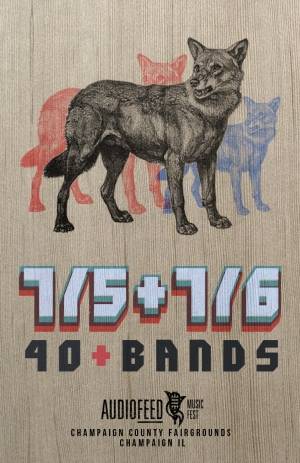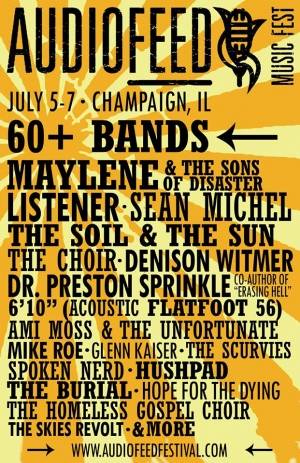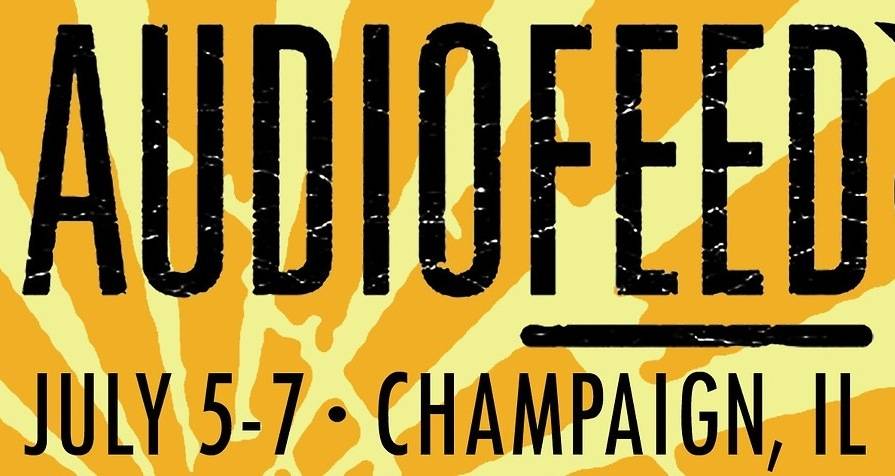Most good things have to come to an end at a certain point in time. Many of you might recall the 29-year run the nationally-renowned Cornerstone Music Festival had. The festival had thousands of attendees from all over the country, but times change and as I said before, good things come to an end.
Following Cornerstone’s phenomenal run, a new creation has formed out of the legacy that it left behind. The inaugural Audiofeed Music Festival is taking place this weekend. Audiofeed is the brainchild of a couple of avid “Stoners,” or Cornerstone fanatics, that wish to recognize the greatness that was the Cornerstone festival, while creating something all their own.
The creators of Audiofeed don’t wish to necessarily pick up where Cornerstone left off in 2012, but rather create something different and meaningful in the community of Champaign-Urbana. The all-ages event is taking place at the Champaign County Fairgrounds this weekend, full of music, camping, activities, speakers, food, and much more. I got the opportity to sit down and speak with Jim Eisenmenger, one of the founders of the festival, about what it has been like producing the festival in its inaugural year, making something that is entirely its own and outside of the realm of Cornerstone, while paying their respects to the festival they admire so much.
From the beginning, I was even unsure of what Cornerstone was, or what Audiofeed Festival plans to be here in Champaign-Urbana. Not being as well-versed in the artists slated to perform at the festival this year, I wanted to get in touch with one of the people who made it possible. Eisenmenger is a family man, and I understood that from the get-go. A CPA by trade and all-around supporter of what Cornerstone did and what the artists at the festival were all about, with a few signs and suggestions, it was apparent that he was going to make the festival happen.
In a way, I wanted to help carry on a long tradition that was Cornerstone. I had no official role in producing Cornerstone, but I was an avid “Stoner” — that’s what the insiders called them, “Stoners.” Just the love for the festival is why I was involved. It was coming up on a breath of fresh air for me. It’s a chance for me, Mr. Conventional CPA, to get ouside of my world entirely. In a setting like Cornerstone, I could take my kids to it. It’s a perfect mix of the hippy-ish counter-culture and all of those things, while not being a drugged out problem situation for kids to go to.
One of my first Cornerstones with my kids was a bit different. In one of their bigger stages, they had tables blocking off the sides of the stage that went towards the back of the stage. They had some folding chairs and lawn chairs, and in-between bands one year, we went and brought a couple of chairs and food to the tables to sit down. When we sat, one of the security crew came up and I thought to myself, ‘Oh, they’re going to tell us to stay away from the stage’ [laughs]. Instead, he just sat drinks down for us. I’m like, you know, this place is great.
The conventional music festival wasn’t what the crew had in mind when continuing the type of vibe Cornestone was giving off, and Audiofeed was looking to do something along those lines, but tailor it to a community that was centered around C-U. When looking to produce Audiofeed, Eisenmenger talked about how he built connections through Cornerstone:
It was very intimate. You could always get access to bands if you hung around after or around back stage to talk to [band members]. I just made it a point to make a lot of connections and introduce myself to a lot of people. I just wanted to get some contacts in case something comes about. That summer, a couple of different bands called me and said, ‘Hey, we’re coming through the area. Can you help us get a show?’ I was like, ‘Sure, I can try to get you something.’ I struck out and struck out trying [laughs]. My wife said, ‘Why don’t we have them play on our front porch?’
We live out in the country, outside of Philo. We started a little music venue on our front porch and we’ve had about a half-dozen of the Cornerstone-type bands come through and play there. It’s outdoors, and we’ve had close to 200 people there from time to time. It’s been a blast. There is quite a network among these ‘Stoners,’ so word spreads in that way, as well as through the bands, as well as through the area.
 The festival was basically off and running at that point. Eisenmenger received a handful of calls randomly aligning on the same day asking if he wanted to participate in the production of the festival, and as a business-minded individual, his place within the structure of the festival was important.
The festival was basically off and running at that point. Eisenmenger received a handful of calls randomly aligning on the same day asking if he wanted to participate in the production of the festival, and as a business-minded individual, his place within the structure of the festival was important.
Cornerstone wasn’t coming back, but the inspiration was clearly there. The crew wanted to make a festival that emulated the same spirit, while the name would stay behind with its 29-year legacy. The renaming of the festival was a no-brainer at that point:
Well, Cornerstone was a proprietary name of this group that had always run it before. For that fact, out of the respect for the group before … it was iconic and trying to live up to that isn’t really what we’re going for, and we didn’t even think or ask if that was a possibility.
The name Audiofeed was a name that came about because we were way late to the game. I got calls about starting the festival in February, so I’m like, ‘Sure, what the heck. Let’s do it.’ So we were ultimately throwing down a half-dozen names and everyone was throwing in different things. Someone came up with that graphpic: the microphone and the corn stalk. Calling it Audiofeed kind of ties in with Illinois and the cornfields. How about it? We were just like, great! We knew we were too late, but it was just as much a functionality as anything.
Certainly Audiofeed is contributing something to the local stitches of Champaign-Urbana in terms of music, but is there something that’s missing that the festival is bringing to the table? There are plenty of bands similar to those playing at Audiofeed already performing within our two cities, but the festival’s aesthetic is something a bit different than what is currently available here in C-U in terms of music festivals. Eisenmenger explains:
Cornerstone was out there a ways. I know there was a decent crowd from Champaign that went out there. So it is not as much filling a hole in Champaign, but what always made a difference for me at that music festival was the sense of community in the sense that there is camping involved. It is a type of place where you’re walking through the camping area, which was everywhere at Cornerstone, and people are eating dinner … the majority of the time people are going to invite you to have something to eat with them or just come crash on a chair. No one would have a problem with it. Just that sense of community is the number one inspiration.
Exposure to and the ability to expose kids and the population at large to a type of music that you don’t usually get exposure to. You know, in an all-ages type venue and setting. For me, personally, I like it because my kids aren’t listening to mainstream pop muisc. It is really an opportunity to do multigenerational exposure to a different kind of culture. I don’t like the success track that we put on our kids in our culture today, and just a different sense of serving the community instead of doing the regular track is what kind of culture I like. I like the fact that a lot of culture and those types of people are there. Exposure to something I’ve never experienced anywhere else.
Beyond that, kids and teenagers seeing that and being exposed to that. A lot of our bands are these struggling artists who play incredible music, but will play to pay for gas money and be fed and stay on the road. At the same time, we’ve got bigger bands and, depending on who you listen to, some legends that have been playing for thirty years. That same culture is there, and allows such a free interaction between the bands and musicians and the fans. I know that’s very, very special and unique for them.
 They’re working to maintain the feeling of Cornerstone, while booking a festival all their own. Getting artists to come perform at the festival was not an easy process, but in due time, the crew made it work:
They’re working to maintain the feeling of Cornerstone, while booking a festival all their own. Getting artists to come perform at the festival was not an easy process, but in due time, the crew made it work:
Luke [Welchel] lives in Lincoln and plays in a band called Hushpad. Ironically, about three weeks into this, he called me and said, ‘I don’t know how we’re going to do this. I’ve never had this much trouble booking bands.’ Then the floodgates started opening. It was one of those things that took a few bigger names to get there. We had a few of the bands we were close to signing up right away; then the door started opening for bands more people know like Maylene and Listener, and Soil & the Sun. Then people started saying, ‘Okay, this is for real.’ Denison Witmer is another somewhat big name, and I think that’s what got us in contact with some others.
You pretty much take your mainstream pop out of the mix and you’ve pretty much got [Audiofeed’s bands]. Acoustic singer-songwriters, folk rock, blues oriented rock, jazz oriented rock. One woman plays the harp — just a fusion of classical folk rock. Then on our heavier stage, Maylene is one of our lighter bands, but a lot of it is hardcore. A decent smattering of punk, too. It’s so diverse.
Audiofeed Music Festival takes place this weekend, July 5 and 6 at the Champaign County Fairgrounds. Check their website for all information regarding the festival.








